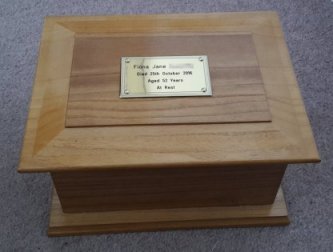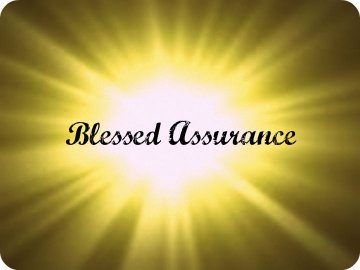It’s fifteen months ago today since my lovely wife Fiona left us to go to her Heavenly reward. A year and a quarter. My goodness.
I have to say that I feel like I personally died, figuratively, several times over the time leading up to her loss. By nature, I am an ideas man; a fixer, a problem-solver. I can fix anything. But I couldn’t fix Fiona. When you can’t fix something; you can fix everything else but not the thing that’s most important, it leaves you thinking you can’t fix anything else. Here’s a quote from a chap on the Channel 4 series ‘Escape’, who had lost his daughter at the age of one month old – “When you come up against a challenge you can’t win; you just physically can’t fix – I couldn’t fix her – no-one could – and that’s the thing that makes you wonder if you can do anything ever again.” I can so identify with that. This was something I couldn’t fix, and that’s hard for me to accept. In this post, I would like to try to describe what it’s like to engage in that terrible fight with cancer, and how I coped with it. I’m sorry to share this even at all, but I figured the message of hope it contains more than makes up for the darkness!
The Fight
Over the three and a half years of Fiona’s illness, my heart was battered so many times by so many colossal blows, like standing in the sea and being smashed by a series of huge waves: Fiona’s early pains in mid-2013, where, being a professional in the medical field, I had a pretty good idea of what was going on; the shocking diagnosis itself in early 2014 and feeling the ice water of terror running through my bloodstream (an experience I would not recommend); seeing Fiona waste away under the terrible effects of the chemotherapy; not knowing from one day to another what was going to happen; how long we had left. The uncertainty. The worry. The anguish. Seeing the girl whom I love beyond any other mortal person fighting the fear, the pain, the symptoms. Seeing her weaken and not be able to do the things she wanted. Living for all that time under the death sentence that is pancreatic cancer, not knowing whether or not she would be healed, knowing that the only human chance for her to be made well would be to have a brutal operation that could well remove the tumour, but an operation in which one patient in twenty dies on the operating table. An operation which she could not have, in any event, because the tumour was wrapped around too many important blood vessels thus making the tumour inoperable. An operation which, even after all that, gives only a 50% chance that the cancer will not return (I had a friend who actually did have the operation, and he died last year despite it). Living each day knowing that her condition could (and eventually would) suddenly deteriorate and that each day could be her last. Living with this constant companion of horror, of fear, of – as I said – the death sentence. It’s like being on death row together.*
Can you imagine the kind of psychological and emotional pressure that this creates for the patient, for her family, and for someone like me who was her prime carer? The weight of the constant vigilance for certain signs and symptoms that might indicate a serious infection (due to the chemotherapy suppressing the immune system), and the responsibility for making sure she gets the proper care in that event? In my lifetime, I have personally saved several people’s lives, from that of a girl I was going out with (before I met Fiona) in early 1982, whom I saved from being hit by a truck, to a friend in my car when I was driving and we were nearly forced off the road by a rogue trucker, to my own father in whom I diagnosed a serious, acute, life-threatening illness and got him to hospital just in time. But Fiona’s life I saved several times, particularly on one especially memorable occasion when my daughter Ellie called me home from work because her Mum was really ill, and I got home and took one look at her and knew exactly what was going on. Without our intervention right there and then she would have died within a couple of hours, that was how serious it was – a condition called ‘neutropenic sepsis’ – a systemic infection which simply runs rampage because the immune system can no longer fight that infection effectively. It just goes to show how amazing our (working) immune system is; every couple of hours there are infective threats like this dealt with silently and unobtrusively by our body’s defences, and we don’t even notice it! But when someone is immunosuppressed – that is, the immune system is degraded for whatever reason (in this case, the chemotherapy) – the chances of a lethal infection are quite high.

Another time, she was on a new chemotherapy regime and she had what’s known as an ‘adverse drug reaction’, a name that speaks for itself. Her heart rate went tachycardic (very, very fast, in this case getting on for 190-200 beats per minute) and if I had not called it, she would have died there and then. And this kind of thing takes its toll. What this stuff does emotionally and psychologically to a person, to a family, is beyond description. Unless you have personally lived through this sort of thing, you have no way of knowing what it will be like – it’s different for everyone – or how you will cope.
(Warning: This next section contains a couple of mildly medical pictures. If you’re squeamish, you might want to be careful 🙂 )
Well, each of us copes in different ways, and one of the ways in which many carers, partners and relatives care is by doing things to help. So long as the help is welcome (remember that the patient may not want to feel dependent on others, so there needs to be sensitivity here) then this is a good way to feel you are doing something positive. Helping with shopping, transport, cleaning, cooking, washing, writing to officialdom, and of course just being there when needed. I have the useful ability to be able to come instantly, fully awake at any time during the night, and that was really useful if Fiona had bad chemo side effects at night, so I could check her signs and symptoms with a clear head, and decide whether or not medical intervention was needed.
Also, although I am not medically-trained, I am, as I said, a professional in the medical field. For 12 years, I was in medical research, and I have now worked in pharmaceuticals for over twenty years, and for all my adult life I have been a trained First-Aider. For that reason, the nursing staff in the chemo ward were happy to train me to service Fe’s PICC line, which is a simply amazing bit of kit.
Allow me to explain. A PICC line is a ‘peripherally-inserted central catheter’ and is simply a plastic tube that goes into a vein in the patient’s arm just above the elbow…
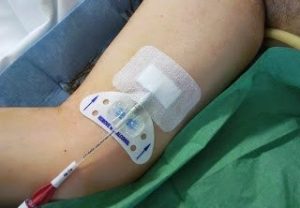
…and continues right inside into the chest cavity, exiting in the superior vena cava, which feeds directly into the heart.
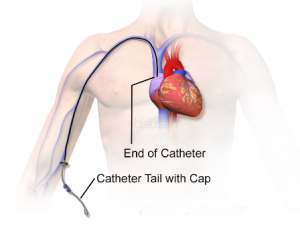
This allows us to administer things to the patient easily, like antibiotics, saline drips, fluids, and of course chemotherapy, all of which can be administered via the same route and without having to make any extra holes in the patient, which is of course painful, uncomfortable and not without risk, especially when administering chemotherapy. The PICC line also allows us to take blood samples directly as required, again without causing pain or discomfort to the patient. It’s all very clever and very useful, improving patient comfort no end.
But the PICC line needs to be ‘serviced’, and that means flushing it with saline and anticoagulant once per week; also the skin around the insertion site needs to be cleaned and the dressing changed weekly. Normally, this would mean a visit to hospital, or at least staying at home so that the District Nurse can come in and do the honours. But being able to service the PICC line ourselves, without ‘outside’ help, meant that we were free to go off on holiday (or even just service the PICC line at home when we wanted to, rather than wait in for the Nurses), and simply take the PICC line servicing kit with us – dressings, saline, syringes, sterile wipes, blood sampling tubes and what have you. I would say that, for us, this was the main specialised way in which I could help and free up a lot more time simply for us to be together. I have no doubt that others reading this may be able to use their specialist skills to help their loved one in a similar way.
Another part of the fight, though, was the pain of seeing my lovely lady wasting away. Fiona always had all the right curves in all the right places, but chemotherapy plays havoc with the body in so many ways, and one of these ways is the loss of appetite, and sometimes the inability to keep food down. And so, Fiona lost a lot of weight over those years, as well as having much of her hair fall out. Notably, though, in many ways this allowed Fiona’s inner light to shine out all the more strongly. So far on my blog, I have posted pictures only of the healthy Fiona. I have not posted pictures of her as she was during her illness, because seeing those pictures brought back the memory of the horror and pain of those times. But now, thanks to talking these things over with my grief counsellor, I can look at those pictures more easily.
So today I have posted pictures of her, radiant, even with little hair and sometimes much thinner than she was.
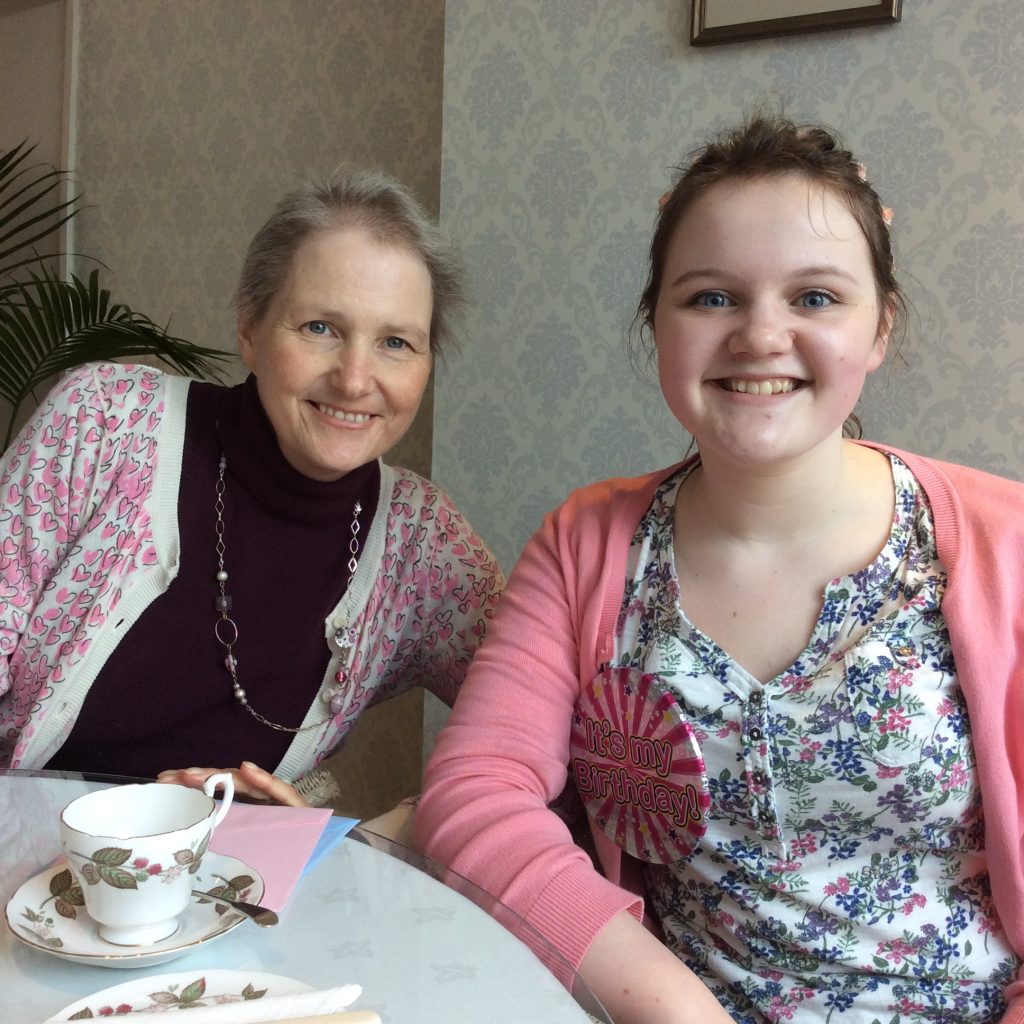
So, why am I writing all this? Why all this talk about the literally life-changing illness that cancer is? Why describe all the horror, the adjustments, the changes?
Because in all this, in all the despair and hopelessness, I want to testify to the closeness and comforting Presence of Jesus. In all this stuff, all this horror, He was constantly there, letting us feel His Presence, letting us feel His peace, such that people commented on how ‘brave’ we all were. But this was the ‘peace that passes understanding’; the supernatural peace that comes when you know God has got everything under control, even if the eventual outcome is probably not the one you would have wanted. It’s not so much that God necessarily changes our circumstances; it’s more that He helps us get through them. Some would say, ‘Why use God as a prop? Most people cope without him!’ Well, I am not sure they do. How do we know that God is not the One Who provides the strength for people to cope even when they do not acknowledge Him? God causes the sun to shine on the righteous and unrighteous alike (Mt 5:45); why not also His Grace, albeit unasked, to cope with our circumstances as they happen? Surely God draws near to the broken-hearted, no matter what their faith background, because that’s just what He’s like. Christians by no means have a monopoly on God’s favour; they are simply more aware of it than others.
As I have said before, I have a steady confidence that death is no longer the end**. I believe that I will see Fiona again. I also believe in God’s healing power and His ability to work miracles. I tried on two occasions to raise her after she had died, on the proviso that if God did choose to raise her, He had to do it without bringing the cancer back with her. But it was not to be; she has gone to be with Him and I am content with that. As I’ve said before, I would not now, even if I could raise Fiona from the dead from her ashes – which is something that I have not the slightest doubt that God could do – I would not want to bring her back. Although my heart was broken over and over again over the three years fighting the cancer, and in finally losing her, I would not ever want to pull her away from what she has now.
You see, God’s hand has been in this all along. In the midst of the suffering, terror, anguish, pain, horror and death, One has walked beside me Who has been through all that Himself. Jesus is no stranger to human suffering. But after all He went through, He was raised back to life. I believe that not because the Bible says it, but because I personally have experienced Him walking with me in everyday life. And if that’s true, then He is simply the forerunner, the downpayment, of the life after death – a new kind of life which is unimaginable to us now – and the demonstration and guarantee that death is indeed not the end. Knowing this changes a person’s entire outlook on life and death, and everything that goes in between.
It also gives us hope, which I believe is absolutely vital when fighting an illness like this. Hope is what keeps you going; hope is what you can hold on to even when the future looks impossible.
When you are first given the diagnosis, and there is little medical hope, still there is the chance – however slight – that something medical might be possible. New research is always coming up with new ideas and treatments, sometimes even actual cures. I should know; I was a professional in the field of medical research for 12 years. This is not wishful thinking; this is what medical science does. We are always coming up with new things.
When medical science gives us no hope, still there is the hope that God might well perform a miracle. My readers know that I believe in this sort of thing; I have been supernaturally healed of things in the past, and I have been involved in others’ healings too. I have seen and experienced these things at first hand. That guarantee that death is not the end, that I mentioned above? The same Power that raised Jesus from the dead is alive and living right now in my heart and in yours (Rom 8:11). For God, all things are possible, even healing incurable conditions. Remember that for something to be a miracle, you have to have something that’s impossible for us to do ourselves. And that is in itself a real hope.
But sometimes the answers to your prayer are not the answers you hoped for. In this case, Fiona died. But still I have that hope – that I will see her again – because of the supernatural assurance I have in my heart of the Love that will not let me go; nor will He let go of Fiona. Again, this is not wishful thinking. This hope is founded on my own real experience of a real Jesus, in real life.
Finally, I want to share also this stunning testimony, which again reinforces my claim to my supernatural hope. I have a friend in America called Steve. Steve has been praying for Fiona and our family since hearing of her diagnosis in early 2014. Here’s what he wrote to me in response to my email informing him of Fiona’s passing on that day fifteen months ago:
“God woke me up this morning at 5:35am my time (about 11:30am your time), which is unusual. I felt He wanted me to pray, so I got ready and went for a walk. I felt an unusual burden to pray for Fiona this morning from 6:15 until 7:15 this morning. I felt led to pray for God to anoint her with His grace, and to help her finish her race well, to wrap her in His presence, and to strengthen her spirit – and yours.
“Precious in the sight of the Lord is the death of His saints. He is so wonderfully present, so kind, so engaged.
“I grieve with you, my brother. I am grateful for the times and the words and the faith that has passed between us over these last years.
“I celebrate with Fiona, my sister, who receives her reward today.”
Steve didn’t know it at the time, but 7:15am his time was 1:15pm our time; the precise moment when Fiona died. Even at times like that, God’s hand is so obviously present.
Even though we can’t see it at the time, God’s hand is indeed on everything that we do. He takes a minutely detailed, utterly fascinated and absolutely loving interest in every detail of our lives, not in a creepy way, but in a getting-involved sort of way. I want to encourage you today in that I want you to know that nothing that you are going through, nothing you are doing, have done or is happening to you, nothing can separate you from the Love of God in Christ.
This has been my experience:
“No, in all these things we are more than conquerors through him who loved us. For I am convinced that neither death nor life, neither angels nor demons, neither the present nor the future, nor any powers, neither height nor depth, nor anything else in all creation, will be able to separate us from the love of God that is in Christ Jesus our Lord” – Romans 8:37-39
“God is our refuge and strength, a very present help in trouble” – Ps 46:1 (KJV)
If you are going through a fight like this right now, be encouraged. God is so much closer than you think. He cares, and He holds you in His arms. And nothing and no-one can change that.
Header picture shows a radiant Fiona at Godshill, Isle of Wight, in July 2015.
*I know that my family, Fiona’s family, and our friends and colleagues all suffered too, each in their own way. And it is not my intention here to downplay that suffering in any way. But I am writing this only from my point of view, which is the only point of view that I can report on accurately. We each take these things, and process them, in our own way. I do not feel it is either my prerogative or my duty to make assumptions on what others were and are feeling. That is their story.
**That death is no longer the end has profound ramifications. Absolutely profound. Rather than spoon-feed you, I’ll just let you think about it for yourself. Ask yourself this question: “What attitudes would change in my life if death is no longer the end?” If you think about this in any great depth, the results will change your life. It did for me.











